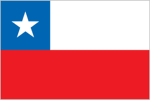Compare
Curacao
to
Chileto
ChileChile has an unemployment rate of 6.30% while Curacao has 13.00%
This entry contains the percent of the labor force that is without jobs.
Source:
CIA World Factbook
Curacao consumes 20.5926 gallons of oil per day per capita while Chile consumes 0.7770
This entry is the total oil consumed in gallons per day (gal/day) divided by the population. The discrepancy between the amount of oil produced and/or imported and the amount consumed and/or exported is due to the omission of stock changes, refinery gains, and other complicating factors.
Source:
CIA World Factbook
The GDP per capita in Chile is $19,100 while in Curacao it is $15,000
This entry shows GDP on a purchasing power parity basis divided by population as of 1 July for the same year. A nation's GDP at purchasing power parity (PPP) exchange rates is the sum value of all goods and services produced in the country valued at prices prevailing in the United States. This is the measure most economists prefer when looking at per-capita welfare and when comparing living conditions or use of resources across countries. The measure is difficult to compute, as a US dollar value has to be assigned to all goods and services in the country regardless of whether these goods and services have a direct equivalent in the United States (for example, the value of an ox-cart or non-US military equipment); as a result, PPP estimates for some countries are based on a small and sometimes different set of goods and services. In addition, many countries do not formally participate in the World Bank's PPP project that calculates these measures, so the resulting GDP estimates for these countries may lack precision. For many developing countries, PPP-based GDP measures are multiples of the official exchange rate (OER) measure. The differences between the OER- and PPP-denominated GDP values for most of the wealthy industrialized countries are generally much smaller.
Source:
CIA World Factbook
The per capita consumption of electricity in Curacao is 6,592kWh while in Chile it is 3,105kWh
This entry consists of total electricity generated annually plus imports and minus exports, expressed in kilowatt-hours. The discrepancy between the amount of electricity generated and/or imported and the amount consumed and/or exported is accounted for as loss in transmission and distribution.
Source:
CIA World Factbook
243 in every 100,000 people are currently imprisoned in Chile compared to 285 in Curacao
This entry contains the number of people in penal institutions, including pre-trial detainees. Comparability is hampered by differences in local practice, including whether psychiatrically ill offenders are under the authority of the prison administration. People held in a form of custody not under the authority of a prison administration are not included in this figure.
Source:
International Centre for Prison Studies
 With its 17,363,894 people, Chile is the
64th largest country in the world by
population. It is the 38th largest country in the
world by area with 756,102 square kilometers.
With its 17,363,894 people, Chile is the
64th largest country in the world by
population. It is the 38th largest country in the
world by area with 756,102 square kilometers.
Prior to the arrival of the Spanish in the 16th century, the Inca ruled northern Chile while the Mapuche inhabited central and southern Chile. Although Chile declared its independence in 1810, decisive victory over the Spanish was not achieved until 1818. In the War of the Pacific (1879-83), Chile defeated Peru and Bolivia and won its present northern regions. It was not until the 1880s that the Mapuche were brought under central government control. After a series of elected governments, the three-year-old Marxist government of Salvador ALLENDE was overthrown in 1973 by a military coup led by Augusto PINOCHET, who ruled until a freely elected president was inaugurated in 1990. Sound economic policies, maintained consistently since the 1980s, contributed to steady growth, reduced poverty rates by over half, and helped secure the country's commitment to democratic and representative government. Chile has increasingly assumed regional and international leadership roles befitting its status as a stable, democratic nation. In January 2014, Chile assumed a nonpermanent seat on the UN Security Council for the 2014-15 term.
Check out the recommended reading list below for great sources of information on Chile